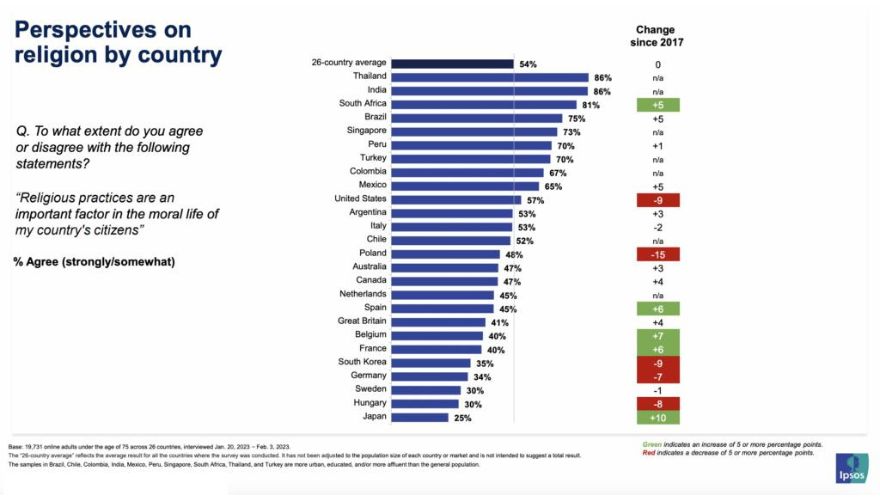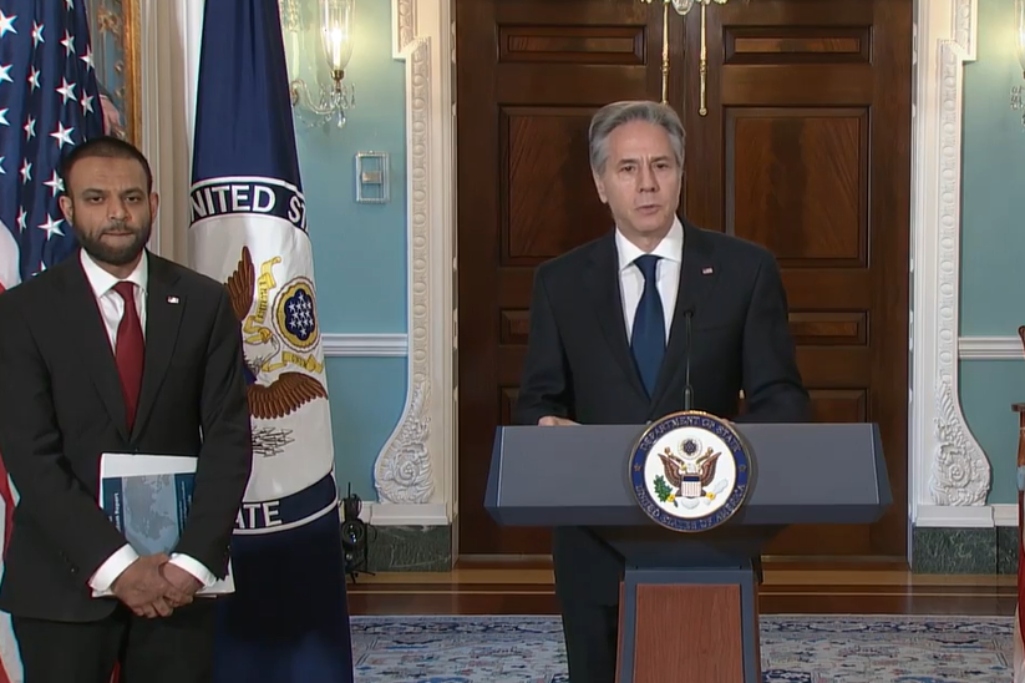
WASHINGTON (BP) – Nearly half, 47 percent, of the global population believes that religion does more harm than good, Ipsos said in its latest poll on religious beliefs and tolerance, though the firm did not explore the reasons behind the perception.
In the U.S., 39 percent of respondents expressed the belief, Ipsos, a multinational research firm, said. The perception is most common in India, at 73 percent; in various Western European countries, ranging from a high of 70 percent in Sweden, to 66 percent in Great Britain and low of 49 percent in Italy; and in Japan, where 52 percent agreed with the perception.
The belief is lowest in Thailand, a largely Theravada Buddhist population, polling at 27 percent. South American countries were also among the lowest, ranging from 39 percent in Colombia to 32 percent in Peru.
Japan saw the biggest growth in a negative view of religion, growing by 26 percentage points since the Ipsos 2017 Global Advisor survey, followed by Sweden, where the number grew by 8 percentage points. The largest dips were seen in Hungary, dropping 16 percentage points to 37, and in Argentina, dropping 16 percentage points to 33.
Ipsos based its findings on a survey of 26 countries through the Ipsos Global Advisor online survey platform, conducted between Jan. 20 and Feb. 3. Ipsos interviewed 19,731 adults ranging in age from 18 to 74, depending on the country, including online and in-person inquiries.
Large generational and geographical variations were seen among the countries studied, with questions focused on the prevalence of religious affiliation and practice, religious beliefs, the role of religion and the extent to which it defines personal identity and morality.
“Most geographic differences tend to follow a similar pattern, opposing a highly religious Global South to a mostly secular Global North,” Ipsos said in releasing the data. “However, major generational shifts are emerging in many of the 26 countries surveyed where younger people are less likely than older adults to identify as Christian, especially Catholic, and more likely to identify as Muslim or of some other faith.”
In 11 of the 12 countries where at least 15 percent of respondents identified as Protestant, Evangelical or simply Christian, Gen Zers – those born in or after 1997 – are less likely to identify as such when compared to boomers, those born in or before 1964, Ipsos found. In Belgium, Italy, Peru, Poland, France and Chili, generational gaps exceed 20 percentage points.
“Generational differences vary when it comes to not having a religion, i.e., identifying oneself as either atheist, agnostic or just ‘spiritual,’” Ipsos said. In nine countries, Gen Zers were more likely than boomers to say they had no religion.
When asking whether respondents believed in God “as presented in the Scriptures,” Ipsos did not separate the Bible from the Torah nor the Quran. In the U.S., 52 percent of respondents said they believe in a God of the Scriptures, 22 percent professed a belief in a higher power that is different from God as presented in Scripture, 12 percent were atheist and 16 percent wouldn’t say.
In other findings, 52 percent of respondents expressed a belief in heaven, but it was not clear whether they had in mind a heaven as expressed in the Bible or the Quran. Nearly half, 49 percent, believe in supernatural spirits, while 41 percent believe in the devil and/or hell.
In addition to the U.S., Ipsos included in its study Argentina, Australia, Belgium, Brazil, Canada, Chili, Colombia, France, Germany, Great Britain, Hungary, India, Italy, Japan, Mexico, the Netherlands, Peru, Poland, Singapore, South Africa, South Korea, Spain, Sweden, Thailand and Turkey.
Results are available here.
(EDITOR’S NOTE – Diana Chandler is Baptist Press’ senior writer.)


